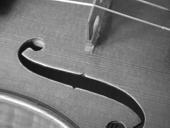|
Joe Watson recently caught up with Jacques Cohen, the Musical Director of the Isis Ensemble, shortly after the launch of their new Meridian recording, Music
for Strings. Here뭩 what Cohen had to say about his own inspirations,
working with the Isis Ensemble and recording with Meridian Records.
JW: What first
inspired you to become a conductor and why?
JC: Almost
as early as I can remember I had music going round my head - both other
people's and the stuff I made up myself. When it was music by other people I
would wonder how it would sound if it was written or played differently. I
remember being fascinated by two different recordings of The Rite of Spring - one by Bernstein the other by Mehta. I
couldn't understand how the same piece could sound so different. Later, when I
discovered scores I was fascinated by every aspect of how the composer wrote
them and how a conductor prepares them for a performance, although I had no
practical understanding of any of it until much later.
I started conducting when I was at school. I had written a piece for the youth
orchestra I played in. I hadn't considered conducting it myself but the
conductor suggested it might be a good idea, and I have been conducting more or
less continuously ever since.
JW:
Who has been the most important influence on your musical career and
why?
JC: Not many people know that my first instrument is trumpet. I had a fantastic
trumpet teacher who was not only a rigorous technician and instilled a very
strong sense of musical discipline but he had a very strong musical instinct
and was the first person in my experience to go beyond the notes to the music. It still surprises me how many people don't seem to get that.
But there are loads of musicians who have that quality and who I really admire.
The most inspiring thing for me is the scores of the great composers.
In recent
years, the person who has helped me has unquestionably been my wife, Michelle,
not only because she believes in me and has given me the confidence to start
projects like this, but also because she is a fantastic musician in her own
right so I trust her judgement - the musicians of the Isis Ensemble do too, as
she produced the sessions for this recording of course!
JW:
Tell our listeners a little about the programme of this particular Meridian recording; what compelled you to record these
particular composers
and works?
JC: We
wanted the CD to be a showcase for the isis
ensemble - and coincidentally that's exactly how the recent review in Gramophone described it!
There are
lots of CDs of string orchestra music of course and if you're not careful it
can so easily sound like nice background music, but we have always prided
ourselves on doing really exciting concerts and we wanted this to be a disc
that would really make people sit up and listen. We have given very exciting
performances of the Tchaikovsky and Elgar serenades for example and we may get
around to recording them one day but for our first disc we thought it would be
more interesting to do previously unrecorded stuff. Both the musicians in the
ensemble and I have a feeling for East/Mid-European music and all the pieces
are inspired by or from that part of the world. You wouldn't think it would be
easy to finalise a programme that would fit together well, that we were really
enthusiastic about and that would fit all of the above criteria but we were
lucky.
JW: Describe for us, if you will, the experience of
working with such an
experienced and inspiring band of musicians as the Isis Ensemble.
JC: It's a privilege to work with such a fantastic group of musicians and great that
players of the callibre of Susanne Stanzeleit, Andrew Fuller, Judith Busbridge,
Robin Ireland, Michael Atkinson and Ken Knussen (to name but a few) are so keen
to play in the group.
JW: Finally, I wonder
if you might indulge us by telling the listeners why you chose to record
with Meridian Records?
JC: One of
the problems with recording seems to me to be that it can encourage people to
play safe and I always prefer to hear an exciting performance. The Meridian ethos seems geared to more accurately recreating
the experience of a live concert and because of the natural sound philosophy,
the musicians feel as though they have more control over the finished product;
you know that the listeners are getting what you're playing. It's also great to
work with a brilliant engineer like Richard Hughes.
|





